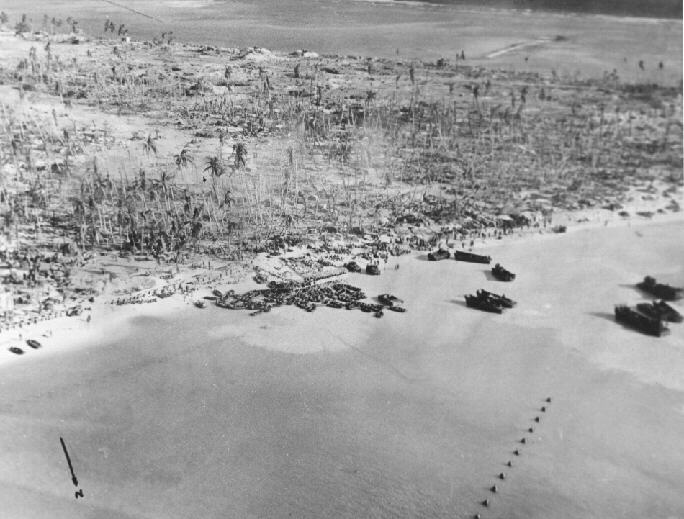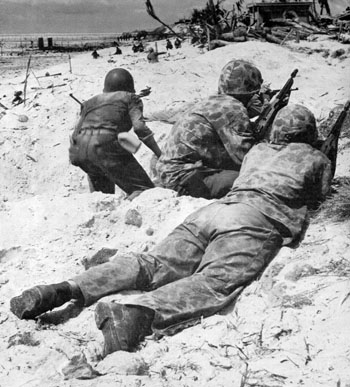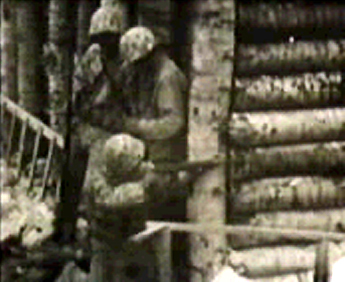'My buddies who didn't make it, they're the heroes'
By Gary Warth
North County Times, November 22, 2003
"I was scared to death," Will Sooter said. "I did a lot of praying. I prayed a lot on that island."
Sooter, an 89-year-old Carlsbad resident, had every right to be scared as his Higgins boat approached Betio on Nov. 20, 1943. In the next three days, more than 1,000 Americans would die on the island, not more than a mile long and 300 yards wide. Back home, the country would mourn the worst loss of Marines to a single battle in history.
At the moment, the U.S. Marine corporal's only thought was getting out of the boat and making it to shore alive.
The day had begun early for the 1,800 Marines aboard the transport ship Monrovia, with a predawn breakfast of steak and eggs followed by orders to wait in a compartment below.
A Private in the compartment with Sooter slid off his bunk and accidentally detonated a hand grenade when it caught on a chain around his bed. Several men were injured, though Sooter was not, but the landing was delayed.
That could have been a good thing, since the Marines in the first wave to attack the island were mowed down by waiting Japanese troops. Then again, boats landing in later assaults had to deal with receding tides that exposed coral reefs and left Marines open to enemy fire as they waded to shore unprotected.
In any case, Sooter had no way of knowing what awaited him as he sat in the boat around noon.
"You don't land standing up," he said. "You're sitting down. You don't see anything."
The men got the message to lock and load, and Sooter knew he was about to land. Besides the heavy M-1 rifle he carried, the demolition engineer had sticks of dynamite and detonation gear strapped to his chest. Somewhere in the items he carried was a picture of his wife, Hilda, whom he married in Illinois six months before enlisting in 1942. He would go 3 1/2 years before seeing his bride again.
Sooter enlisted at 28, so old that other Marines called him "Dad." He had completed basic training in San Diego and demolition training in New Zealand, but nothing he learned could have prepared him for what he was about to experience.
"When I did get out of the landing craft, there were dead Marines floating around," he said. "It was a horrible sight."
His boat landed next to a pier, which he waded under to reach the beach. He was fortunate to have landed on a side of the pier where there was no coral. In a tragic misunderstanding, a Marine had relayed to the ships that there was no coral on the pier's right side. He meant his right, facing from the beach to the sea, Sooter said. Marines who steered their boats to their right hit the coral and were trapped while Japanese fired on them.
Sooter landed with the 18th Marines, 2nd Marine Division, A Company.
"The island was so smoky from fuel dumps going off, it just engulfed the island," he said. "Most of the coconut trees had been knocked down, but the ones that hadn't been had Japanese snipers in them."
The Americans' only protection was a 4-foot seawall made of coconut-tree logs. Sooter remembers giving dynamite sticks to one lieutenant who kept running inland and blowing up Japanese pillboxes.
The lieutenant failed to return after one such run, and later was posthumously given the Medal of Honor.
"I'm not a hero myself," Sooter said. ""My buddies who didn't make it, they're the heroes."
On the second day ashore, Sooter was carrying a box of ammunition on the beach when he heard someone call his name. He turned to see his younger brother, Charlie. Sooter had no idea his brother was among the men in a tank outfit his ship had picked up en route to Tarawa.
"I had a good cry," he said about the reunion. "I hadn't seen him in a year."
The brothers spent that night together in a foxhole, getting little rest because of nearby machine-gun fire. In the morning, they discovered their foxhole was next to a Japanese pillbox.
Charlie approached the pillbox and dropped in a grenade. The Japanese kept firing. He got some dynamite from his brother and again sneaked up on the pillbox to drop the sticks in. This time the firing stopped. Charlie later would be given a Silver Star for heroism.
Because the Americans had no shelter other than their helmets and foxholes, Sooter said the most frightening moments came when an air raid siren sounded. Terrified as he watched a Japanese plane approach, Sooter was relieved when he saw the pilot drop his bombs so far off target that he missed the island completely. Another bomb run also was ineffective, and the Americans nicknamed the pilot "Washing Machine Charlie" because of the rickety noise from his airplane.
Fighting was over by the third day, with almost all Japanese soldiers killed, either by Americans or by their own hand. Sooter remembers looking in a pillbox and seeing Japanese soldiers who had killed themselves with their rifles.
Sooter stayed on Betio for seven days. While waiting for orders to leave, he helped carry Marine bodies to shore and watched as Navy Seabees bulldozed trenches and buried hundreds of dead.
By the war's end, Sooter would see combat at Saipan, Tinian and Okinawa. But nothing, he said, was like the carnage in Tarawa.
Sooter retired from the Marines in 1968. He and Hilda are still married. These days he spends his times as an award-winning gardener and award-winning wood-carver, and she is an award-winning quilter. The couple celebrated their 61st wedding anniversary this year.
Contact staff writer Gary Warth at gwarth@nctimes.com or (760) 740-5410.




Send an Email:
copyright 2004 T.O.T.W.
Created insert date 2004

Return to Index